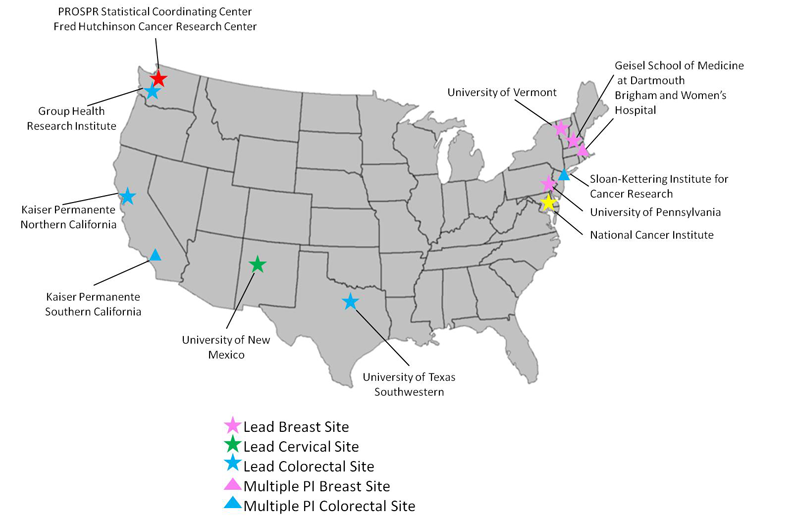|
|
Population-based Research Optimizing Screening through Personalized Regimens (PROSPR):
|
|
|
PROSPR Research Sites & Principal Investigators
 [D]
[D]
PROSPR Research Sites
| Principal Investigator(s) |
Institution |
Aims |
| Breast |
| University of Pennsylvania |
- Compare the false positive rates of 3D vs. 2D digital mammography.
- Evaluate the ability of an imaging biomarker to reduce false positive rates.
- Test risk communication strategies.
|
| Geisel School of Medicine at Dartmouth and Brigham and Women’s Hospital |
- Map screening process for heterogeneous health care systems and develop electronic health record (EHR)-integrated tools for improving screening processes.
- Develop an EHR-integrated module to generate tailored risk assessments and screening recommendations.
- Compare the effectiveness of care processes for established and emerging modalities.
|
| University of Vermont |
- Develop prognostic markers for personalized management of ductal carcinoma in situ (DCIS).
- Identify molecular, morphologic, radiologic, and tumor microenvironment markers that predict progression of DCIS to invasive disease.
|
| Cervical |
| University of New Mexico |
- Compare self-collection versus provider-directed human papillomavirus primary screening.
- Analyze statewide cervical screening, diagnosis and treatment failures.
- Compare the effectiveness of alternative interventions using decision-analytic approaches across the cervical cancer care continuum.
|
| Colorectal |
| Group Health Research Institute |
- Identify low-risk groups that might benefit from less intensive screening.
- Evaluate the potential mortality impact of risk-based screening.
|
| University of Texas Southwestern |
- Optimize risk-based screening in a large safety-net system.
- Identify clinic and health system factors associated with screening adoption in practices that serve vulnerable populations.
|
| Kaiser Foundation Research Institute |
- Identify failures in the screening process and develop corrective strategies.
- Compare benefits, harms, and effectiveness of alternative screening strategies, including those based on individualized risk.
|
|
|

